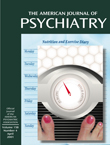Poststroke Depression
To the Editor: We compliment the efforts of Robert G. Robinson, M.D., and colleagues (1) on the study of the treatment of poststroke depression. However, there are several limitations that caution against complete acceptance of their results.
The authors stated that 85% of the 104 patients were randomly assigned to either nortriptyline or fluoxetine. Recalling that 48 of the total were nondepressed and demonstrated no significant differences, we are really looking at the remaining 56 patients. Of the depressed fluoxetine group of 23, only 14 (61%) were randomly assigned. Likewise, of the 16 in the depressed nortriptyline group, only eight (50%) were actually randomized. It is hard to feel assured of the superiority of nortriptyline to fluoxetine when comparing only 14 randomized patients to eight. In addition, only one patient’s data on nortriptyline treatment after placebo were analyzed.
It is not surprising that pushing elderly patients up to a mandatory dose of 40 mg/day of fluoxetine would lead to akathisia, gastrointestinal symptoms, and dropout. After polling our colleagues, we found it exceedingly rare that any of our patients over 65 years of age were taking 40 mg/day of fluoxetine, and, anecdotally, no one could think of a reference equating that dose to 100 mg/day of nortriptyline.
Although the authors may have used a Hamilton Depression Rating Scale score of 12 or higher as the criterion for depression, most studies have used 17 or greater as an inclusion criterion (2). Using a smaller interval set at the lower level may capture different patients. Compounding that variable is the broad range of weeks poststroke in the fluoxetine group (mean=16, SD=35) in contrast to that of the nortriptyline group (mean=5, SD=4). The highest incidence of depression, to our knowledge, was reported at 2–7 weeks poststroke (3). One wonders how this might influence such small, randomly assigned groups.
Of concern is the 12-week cutoff point. Elderly patients are known to respond to antidepressants much later than other patients, and that is particularly so for selective serotonin reuptake inhibitors (SSRIs). In addition, there are now data indicating that patients taking SSRIs gain weight after 12 weeks, so this would not have been noted (4). Granted, patients taking tricyclics may keep gaining weight longer. This is not always of benefit, particularly when elderly patients need assistance transferring from bed to chair.
There are other studies that have shown SSRIs to be efficacious in treating poststroke depression (3–5). Methodological flaws in this study make it difficult to draw firm conclusions that can be applied to patient treatment until larger populations are studied.
1. Robinson RG, Shultz SK, Castillo C, Kopel T, Kosier JT, Newman RM, Curdue K, Petracca G, Starkstein SE: Nortriptyline versus fluoxetine in the treatment of depression and in short-term recovery after stroke: a placebo-controlled, double-blind study. Am J Psychiatry 2000; 157:351–359Link, Google Scholar
2. Endicott J, Cohen J, Nee J, Fleiss J, Sarantakos S: Hamilton Depression Rating Scale: extracted from regular and change versions of the Schedule for Affective Disorders and Schizophrenia. Arch Gen Psychiatry 1981; 38:98–103Crossref, Medline, Google Scholar
3. Andersen G, Vestergaard K, Lauritzen L: Effective treatment of poststroke depression with the selective serotonin reuptake inhibitor citalopram. Stroke 1994; 25:1099–1104Google Scholar
4. Sussman N, Ginsberg DL: Weight gain associated with SSRIs: a paradox? Primary Psychiatry 1998; 5:28–39Google Scholar
5. Dam M, Tonin P, De Boni A, Pizzolato G, Casson S, Ermani M, Freo U, Piron L, Battistin L: Effects of fluoxetine and maprotiline on functional recovery in poststroke hemiplegic patients undergoing rehabilitation therapy. Stroke 1996, 27:1211–1214Google Scholar



